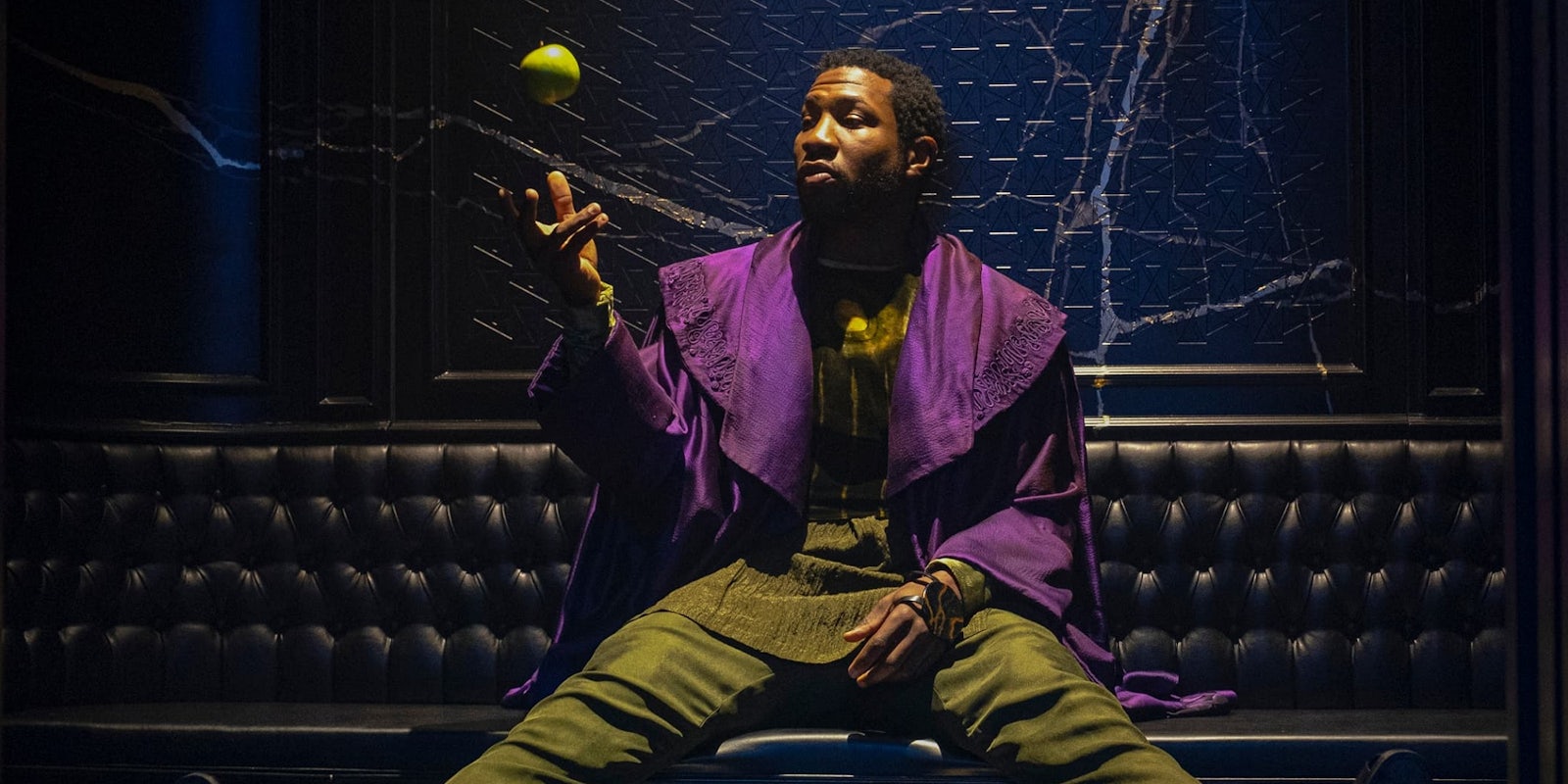This post includes spoilers for Loki and Ant-Man and the Wasp: Quantumania.
When it comes to supervillains, the MCU is distinctly mid. For every great character like Loki or Killmonger, we get two or three fun-but-basic antagonists (Justin Hammer; Hela in Thor: Ragnarok) and just as many outright flops (Ronan Accuser; Kaecilius in Doctor Strange). The MCU formula just doesn’t prioritize well-characterized villains, and when you’re launching a big crossover event with a recurring bad guy, that becomes a problem.
Right now, the MCU is pitching Kang the Conqueror (Jonathan Majors) as a spiritual successor to Thanos, setting the scene for Avengers: The Kang Dynasty in 2025. Echoing Thanos’s foreshadowing in earlier movies, this introduction is twofold: Setting up the relevant worldbuilding (ie. the multiverse) and pumping up Kang’s rep as a formidable opponent. Watching his lead role in Ant-Man and the Wasp: Quantumania, this strategy already feels like a misfire.
While Jonathan Majors’ performance is being singled out as the high point of a mediocre movie, neither Quantumania nor the Disney+ show Loki (Kang’s debut) seem interested in exploring Kang’s personality or thematic purpose. He barely receives an emotional arc. Instead, Kang spends a lot of time either explaining his own backstory (an interdimensional war between rival Kangs) or… having other characters explain stuff on his behalf. His role primarily functions as a set-up for more “important” movies down the line.
As I pointed out in my Quantumania review, Kang’s introduction is bafflingly incompetent when compared to characters like Loki, Magneto, or Killmonger—Marvel’s most complex single-serving villain. These characters have compelling emotional journeys. Through their actions and relationships, we learn more about their political values, their vulnerabilities, and their desires. They certainly don’t set out their entire origin story and motives through a series of infodump monologues. This kind of stuff is storytelling 101—or at least it should be.
Weirdly, the most interesting part of Kang’s Quantumania role is something we barely see onscreen: His friendship with (and betrayal of) Janet van Dyne when they were trapped together in the Quantum Realm. These explanatory flashbacks are overshadowed by Kang’s more formulaic role in the present day, where he holds Ant-Man’s daughter hostage so he can force Ant-Man to steal a MacGuffin. (Yawn.)
Introduced as the despotic emperor of the Quantum Realm, he’s meant to be a ruthless and intimidating figure. But we’ve seen this plenty of times before in the MCU—most obviously with Jeff Goldblum’s Grandmaster in Thor: Ragnarok, an absurd comedy villain whose role is more dynamic and displays more thematic depth than Kang.
The MCU is often criticized for prioritizing teasers for future projects instead of focusing on the story at hand, and Loki and Quantumania are both textbook examples. In Loki, Kang’s final-act reveal derails the main plot. And in Quantumania, Ant-Man and Kang feel like they were shoved together from two separate genres: Ant-Man as a lighthearted second-tier Avenger, and Kang as an epic sci-fi/fantasy villain. In the same way that Civil War disrupted Captain America’s arc for an Avengers crossover event, Quantumania borrows the Ant-Man franchise to launch Kang. Yet it’s still not “about” Kang in any meaningful way.
Think back to Loki’s arc in Phase 1, and you’ll see what I’m talking about. The first Thor movie is a two-hander for Thor and Loki, giving Tom Hiddleston a great dramatic role and establishing Loki as a) entertaining and b) kind of a tragic figure. This quasi-relatable origin story then feeds into The Avengers, where Loki is a more straightforward supervillain. If only Kang received similar complexity in his first lead role.
Depicted as a standard Evil Overlord type with some extra multiverse powers, Kang’s impact hinges on the casting of Jonathan Majors, who earned glowing reviews in smaller projects like The Last Black Man in San Francisco. Good casting can only go so far, though. While Majors injects some mournful gravitas into his role in Quantumania, he isn’t given much to work with.
Marvel’s writers need to figure out who Kang really is before Avengers: The Kang Dynasty, because if not, we’ll end up returning to the “smash two action figures together” school of superhero filmmaking. And we already saw enough of that with Thanos.


